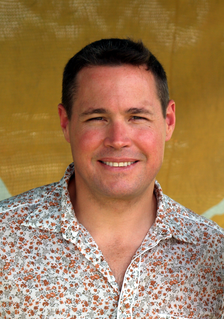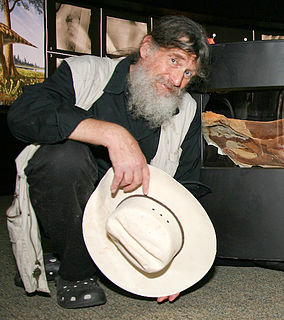A Quote by Jeff Corwin
We live in a time where we have more extinction happening on our planet than since the dinosaurs were wiped out 50 million years ago.
Related Quotes
Global warming, along with the cutting and burning of forests and other critical habitats, is causing the loss of living species at a level comparable to the extinction event that wiped out the dinosaurs 65 million years ago. That event was believed to have been caused by a giant asteroid. This time it is not an asteroid colliding with the Earth and wreaking havoc: it is us.
The early Triassic was a period when the planet was recovering from the worst mass extinction it had ever known - that was the end Permian extinction, where climate change caused in part by mega-volcanic eruptions wiped out ninety-five percent of life on Earth. It took about ten or twenty million years for the planet's ecosystems to stabilize. During that time you saw a lot of weird, out-of-balance ecosystems where, for example, crocodile-like predators ripped the crap out of each other along the coasts.
There is evidence that we are headed into what would be the planet's sixth mass extinction. It's hard to know for sure if you're in one because a mass extinction is an event where over 75 percent of the species on the planet die out over a - usually about a million-year period. The fastest it might happen is in hundreds of thousands of years.
Although humans have existed on this planet for perhaps 2 million years, the rapid climb to modern civilization within the last 200 years was possible due to the fact that the growth of scientific knowledge is exponential; that is, its rate of expansion is proportional to how much is already known. The more we know, the faster we can know more. For example, we have amassed more knowledge since World War II than all the knowledge amassed in our 2-million-year evolution on this planet. In fact, the amount of knowledge that our scientists gain doubles approximately every 10 to 20 years.
Wherever we are, any time of night or day, our bosses, junk-mailers, our parents can get to us. Sociologists have actually found that in recent years Americans are working fewer hours than 50 years ago, but we feel as if we're working more. We have more and more time-saving devices, but sometimes, it seems, less and less time.
Some 3 million years ago, when the earth was a little more than 3°C warmer than preindustrial levels (about 2.2°C warmer than today), Antarctica had far less ice and sea levels were a stunning 25 meters higher than today. If we stay on our current emissions path, the planet will almost certainly be that warm by the century's end.
We are headed to a radically new Earth, at least from our perspective. But from the planet's perspective, this is nothing new. As the geologist Peter Ward is fond of pointing out, we are actually heading back to a time kind of like the Miocene. The Miocene ended about 5.5 million years ago, and it was the last time that the planet had no icecaps.
More than 500 million years ago, vision became the primary driving force of evolution's 'big bang', the Cambrian Explosion, which resulted in explosive speciation of the animal kingdom. 500 million years later, AI technology is at the verge of changing the landscape of how humans live, work, communicate,and shape our environment.
There are things that are more important than the news and what’s happening today. There are these archetypes which are part of the human imagination since humans were presumably imaginative. And I think that’s what [people] find touching, these eternal ideas. It’s one of the things that makes fantasy something that tends to stand the test of time because we’re reading, 50 years later, The Lord of the Rings.
We know little of the consequences of the geoengineering process, such as spraying particles into the atmosphere that shade the planet from the sun's rays and could decrease its temperature. But this process is how dinosaurs disappeared from the Earth about 60 million years ago, by particles spewed by a volcano or a giant meteorite impact, and our species could follow suit.





























